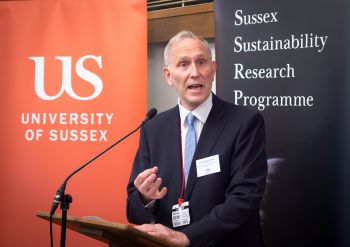‘Smart strategies’ can reduce emissions and more, according to researchers
By: Stephanie Allen
Last updated: Monday, 15 October 2018

Leading academics at the University of Sussex have argued that the ‘transformative systemic change’ called for in the IPCC SR15 report can not only be met, but can also help us tackle other global sustainability goals.
Members of the Sussex Sustainability Research Programme (SSRP) believe that ‘smart strategies’ can help us reduce emissions while providing more energy, protecting forests and meeting global food demand.
Professor Joseph Alcamo, Director of the SSRP at the University of Sussex, said: “Page after page of scientific evidence in the new IPCC report confirms that stronger targets are needed to protect people and ecosystems from extreme climate impacts.
“Another message of the report is that big changes – “transformative changes” – will be needed to stay within a safe limit of climate change. But it also seems that most people don’t have much of an appetite for this change – except maybe those living in vulnerable island states already threatened by sea level rise.
“Most people still perceive climate change as an abstract danger, and not as pressing as their other day-to-day concerns.
“That’s why I think the report’s most important message is that we have a tremendous opportunity to combine climate goals with other goals that concern people, like providing clean energy for the world, growing enough nutritious food for everyone and in an ecological way, by protecting the unique ecosystems of world forests and elsewhere.”
The SSRP currently focuses on finding synergies between the UN Sustainable Development Goals (SDGs) which includes climate action. By finding the potential synergies and conflicts, they believe that more goals can be efficiently accomplished at the same time.
Professor Alcamo explained: “With smart strategies we can provide more energy and food, protect forests, and much more, all while reducing emissions and staying within safe climate limits.
“It won’t be easy, but finding those smart strategies is what galvanises so much of the large body of sustainability research here at the University of Sussex.”
As governments and policy-makers worldwide come to terms with the need for rapid change to address global warming, and questions are raised as to the possibility of reacting in time, Professor Peter Newell points out that some sectors and technologies have already demonstrated an ability to change at speed.
Professor of International Relations, Peter Newell said: "Business as usual will get us nowhere near where we need to be. Rapid transitions are urgently required.
"While the speed and scale of transitions and of technological change required to limit warming to 1.5°C has been observed in the past within specific sectors and technologies, the required rates of change in the energy, land, urban, infrastructure and industrial systems that would need to take place are larger and have no documented historic precedent.
"This presents a huge challenge which Sussex researchers are addressing by building a Rapid Transition Alliance of activists, researchers and practitioners aimed at generating ‘evidence based hope’ about the possibility of rapid transitions.”
But regardless of the opportunities for change, academics are clear that the warnings are dire, and future policies need to take into consideration local as well as global needs.
Professor of Geography, David Ockwell, said: "Sussex research has demonstrated time and again that the rapid, deep transformations needed to keep below 1.5°C are not just technical or economic - they are fundamentally social and political. In the face of urgent demands for global action, it's crucial that the choices made should be fair, democratic and respond to local needs and contexts.”
Professor Ockwell is currently in Kenya for a global consortium, convened by the ESRC STEPS Centre at the University of Sussex, to share stories of transformative change from six continents with the Kenyan government, African Union, business and NGOs. He’s hoping to show how local actions can link together for deep and lasting change.
Geographers also warn that, even if we limit warming, the impacts will continue to hit the most vulnerable and threaten sustainable development.
Professor Martin Todd, Professor in Climate Change, said: “Whilst the need for adaptation will be lower if warming is limited to 1.5°C, the impacts of climate change will continue to jeopardise sustainable development, especially for most vulnerable. Sussex research on climate resilience development in many of the least developed countries remains as pressing as ever.”
Dr Melissa Lazenby, Lecturer in Climate Change, added: "Finally there is a sense of urgency being placed behind our influence on the climate and its associated impacts and it is being made distinctly clear to all via this IPCC special report based on global warming of 1.5°C. It is time for rapid and transformative change at all levels or else we will be faced with many adverse climate impacts which are clearly stated in this special report."

